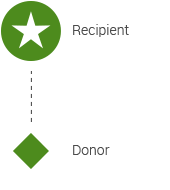The Organ Procurement and Transplantation Network (OPTN) offers a program that allows an incompatible donor-recipient pair to perform a “swap” with another donor-recipient pair.

8. Compatibility Issues
We conduct crossmatching, tissue-matching, and blood-type tests to establish whether the donor and the recipient are compatible. Higher donor-recipient compatibility leads to better transplant success rates. If the evaluation committee establishes that the two make a poor match, or are of incompatible blood types, they may suggest you participate in the Kidney Paired Donation Program.





